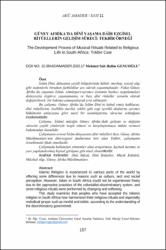| dc.contributor.author | Gençoğlu, Mehmet Sait Halim | |
| dc.date.accessioned | 2021-07-29T08:25:49Z | |
| dc.date.available | 2021-07-29T08:25:49Z | |
| dc.date.issued | 27.01.2020 | en_US |
| dc.identifier.citation | Gençoğlu, M . (2020). GÜNEY AFRİKA’DA DÎNÎ YAŞAMA DÂİR EZGİSEL RİTÜELLERİN GELİŞİM SÜRECİ: TEKBİR ÖRNEĞİ . Afyon Kocatepe Üniversitesi Akademik Müzik Araştırmaları Dergisi , 6 (11) , 157-167 . Retrieved from https://dergipark.org.tr/tr/pub/amader/issue/52410/659587 | en_US |
| dc.identifier.uri | https://dergipark.org.tr/tr/pub/amader/issue/52410/659587 | |
| dc.identifier.uri | https://hdl.handle.net/11630/8945 | |
| dc.description.abstract | İslâm Dîni, dünyanın çeşitli bölgelerinde kültür, mezhep, sosyal algı gibi nedenlerle birtakım farklılıklar arz ederek yaşanmaktadır. Fakat Güney Afrika’da yaşanan İslâm, sömürgeci-ayrımcı sistemin baskıcı uygulamaları dolayısıyla özgürce yaşanamamış ve bazı dînî ritüeller zorunlu olarak değiştirilerek, bir bakıma yumuşatılarak icrâ edilmiştir.
Bu çalışma; Güney Afrika’da İslâm Dîni’ni kabul etmiş halkların; dînî ritüellerini, özellikle mevlid, tekbir gibi ezgi içerikli duâlarını ayrımcı hükümetin anlayışına göre nasıl bir uyumlaştırma sürecine soktuğunu incelemektedir.
Çalışma; İslâmî müziğin Güney Afrika’daki gelişim ve değişim sürecini çeşitli yönleriyle tespit etmesi ve karşılaştırmaya imkân vermesi bakımından önemlidir.
Çalışmanın evreni İslâm dünyasının dînî ritüelleri iken, Güney Afrika Müslümanları’nın dînî-ezgisel duâlarının biri olan Tekbir, çalışmanın örneklemini ifâde etmektedir.
Çalışmada kullanılan yöntemler alan araştırması, kaynak tarama ve yarı yapılandırılmış kişisel görüşme gibi nitel yöntemlerdir. | en_US |
| dc.description.abstract | Islamic Religion is experienced in various parts of the world by offering some differences due to reasons such as culture, sect and social perception. However, Islam in South Africa could not be experienced freely due to the oppressive practices of the colonialist-discriminatory system, and some religious rituals were performed by changing and softening.
This study examines that peoples who have accepted the Islamic religion in South Africa how harmonized their religious rituals and especially melodical prayer such as mevlid and tekbir, according to the understanding of the discriminatory government. The study is important in terms to allows comparison from various perspectives and determines the development and change process of Islamic music in South Africa. While the universe of the study was the religious rituals of the Islamic world, Tekbir, one of the religious-melodic prayer of South African Muslims, expresses the sample of the study.
The methods used in the study are qualitative methods such as field research, resource search and semi-structured personal interview. | en_US |
| dc.language.iso | tur | en_US |
| dc.publisher | Afyon Kocatepe Üniversitesi | en_US |
| dc.identifier.doi | https://doi.org/10.36442/AMADER.2020.17 | en_US |
| dc.rights | info:eu-repo/semantics/openAccess | en_US |
| dc.subject | Religious Music | en_US |
| dc.subject | Religious Rituals | en_US |
| dc.subject | Music Culture | en_US |
| dc.subject | Musical Perception | en_US |
| dc.subject | Muslims in South Africa | en_US |
| dc.subject | Dînî Müzik | en_US |
| dc.subject | Dini Ritüeller | en_US |
| dc.subject | Müzik Kültürü | en_US |
| dc.subject | Müzikal Algı | en_US |
| dc.subject | Güney Afrika Müslümanları | en_US |
| dc.subject | Müzik | en_US |
| dc.subject | Music | en_US |
| dc.title | Güney Afrika’da dini yaşama dair ezgisel ritüellerin gelişim süreci: Tekbir örneği | en_US |
| dc.title.alternative | The development process of musical rituals related to religious life in South Africa: Tekbir case | en_US |
| dc.type | article | en_US |
| dc.relation.journal | Akademik Müzik Araştırmaları Dergisi “AMADER” | en_US |
| dc.department | Seçiniz | en_US |
| dc.authorid | 0000-0002-4207-7757 | en_US |
| dc.identifier.volume | 6 | en_US |
| dc.identifier.startpage | 157 | en_US |
| dc.identifier.endpage | 167 | en_US |
| dc.identifier.issue | 11 | en_US |
| dc.relation.publicationcategory | Makale - Ulusal Hakemli Dergi - Başka Kurum Yazarı | en_US |



















